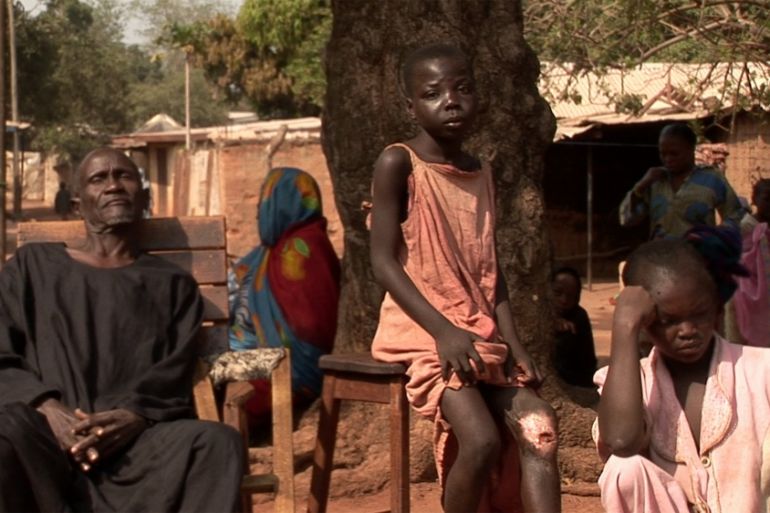
Cahier Africain: Documenting War Crimes in CAR
A tattered notebook holds the promise of justice for hundreds of war survivors as violence resurges in CAR.
Editor’s note: This film is no longer available to view online.
This two-part documentary begins with a small school notebook filled with pages of courageous testimonies from 300 Central African women, girls and men.
Keep reading
list of 4 itemsCan international justice stop Israel?
What will be the outcome of the ICJ genocide case against Israel?
Is Israel committing genocide in Gaza?
They record crimes committed against them by Congolese mercenaries in the early 2000s.
Amzine, a young Muslim woman, gave birth to a child as a result of rape. Her daughter, Fane, is a daily reminder of the suffering she entrusted to this book.
Arlette, a young Christian girl dreams of a pain-free existence after being shot in the leg.
As they go about their daily lives hoping for justice while the war crimes tribunal in The Hague is underway, to their horror, a new war breaks out in CAR.
FILMMAKER’S VIEW
By Heidi Specogna
Originally, Cahier Africain was going to focus on the healing of wounds.
But when war once again broke out in CAR, it became the goal of the film to document a spiralling violence that did not even permit a scar to form over the wounds.
Cahier Africain is the third film I’ve shot in CAR in recent years. It’s not even possible to pinpoint when work on one of the films ended and contemplating the next one – searching for its images – began.
When war once again broke out in CAR, it became the goal of the film to document a spiralling violence that did not even permit a scar to form over the wounds.
The prologue to the actual making of Cahier Africain was exceptionally long. The process of finding and getting to know the protagonists and then developing mutual trust spanned a period of several years.
Shooting the film was an extremely difficult undertaking because with the renewed outbreak of war came the collapse of the country’s entire infrastructure. Virtually nothing worked anymore. Everything volatile and unpredictable. What was valid one day had no validity the next.
There was no clearly defined frontline in Bangui.
To complicate things further, from the first day of shooting onwards, we were a team of just two: due to the dangerous situation, our soundman had decided to take the next flight home.
![Amzine got pregnant when she was repeatedly raped as rebels from the DRC rampaged through CAR in 2002 and 2003 [Screengrab/Al Jazeera]](/wp-content/uploads/2017/12/13a1a55726d4407c8b4e7ffc6051086b_18.jpeg)
Our cameraman, Johann Feindt, possesses an outstanding quality: he’s able to remain unruffled in the midst of the insanity of war, calmly proceeding to seek out his images.
In the middle of all the chaos, we held lucid discussions about how best to show this lunacy, the fear and suffering, in pictures – which images would be strong enough to make the reality palpable for a European audience?
This approach had an important side effect. It helped us keep a professional distance. Otherwise, we wouldn’t have been able to work at all.
I’m often asked how our protagonists are doing now. Since 2015, Amzine and her children have moved to Congo-Brazzaville (the Republic of the Congo). It was meant to be a short family visit, but it seems they now feel at home there.
Amzine and I have no language in common, but I can speak French with her daughter Fane. We talk on the phone every few months.
There’s a spike in malaria now, as happens every year in the rainy season. The family doesn’t have money for the life-saving medicine they need, so we are looking for quick and effective ways to help out.
Arlette and her family are back living in PK 12, their village in CAR. It appears that daily life there has normalised to some extent: the farmer’s market has reopened and Arlette sells peanuts there to help support the family.
Unfortunately, she has not been able to go to school and to learn to read and write as she had wished.
Recurring outbreaks of conflict repeatedly interrupt the normal operation of schools. The country is still caught up in a seemingly perpetual cycle of violence.